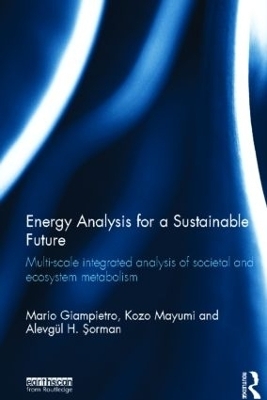
Energy Analysis for a Sustainable Future
Routledge (Verlag)
978-0-415-53966-1 (ISBN)
The vast majority of the countries of the world are now facing an imminent energy crisis, particularly the USA, China, India, Japan and EU countries, but also developing countries having to boost their economic growth precisely when more powerful economies will prevent them from using the limited supply of fossil energy.
Despite this crisis, current protocols of energy accounting have been developed for dealing with fossil energy exclusively and are therefore not useful for the analysis of alternative energy sources. The first part of the book illustrates the weakness of existing analyses of energy problems: the science of energy was born and developed neglecting the issue of scale. The authors argue that it is necessary to adopt more complex protocols of accounting and analysis in order to generate robust energy scenarios and effective assessments of the quality of alternative energy sources.
The second part of the book introduces the concept of energetic metabolism of modern societies and uses empirical results. The authors present an innovative approach – Multi-Scale Integrated Analysis of Societal and Ecosystem Metabolism (MuSIASEM) – capable of characterizing the quality of alternative energy sources in relation to both environmental constraints and socio-economic requirements. This method allows the metabolic pattern of a society to be described in relation to its feasibility, when looking at biophysical factors, and desirability, when looking at socio-economic factors.
Addressing the issue of scale in energy analysis by cutting through the confusion found in current applications of energy analysis, this book should be of interest to researchers, students and policy makers in energy within a variety of disciplines.
Mario Giampietro is an ICREA Research Professor at ICTA (Institute of Environmental Science and Technology), Department of Chemical Engineering, Universitat Autonoma de Barcelona, Spain. Kozo Mayumi is a Professor at the University of Tokushima, Japan. He is a co-founder and organizer of the Biennial International Workshop ‘Advances in Energy Studies’, which started in 1998. Alevgül H. Şorman is a Researcher in the Integrated Assessment and Societal Metabolism group at ICTA, Universitat Autonoma de Barcelona, Spain.
Introduction Part 1: Defining the Problem 1. Energy Accounting: Sources of Ambiguity 2. Energy Analysis: the Troublesome Birth of a New Domain of Knowledge 3. The Aggregation of Energy Flows at the National Level 4. The Proper Use of Semantic and Formal Categories in Energy Accounting 5. Energy Flows Under Human Control: Energy Input, Power Capacity and Human Labour 6. Cutting Through the Confusion in Net Energy Analysis Part 2: Proposing a Solution 7. In Search of a Richer, Integrated and Multi-scale Accounting Protocol 8. Concepts, Ideas, and Representations Underlying the Multi-scale Integrated Accounting of Society’s Energy Metabolism 9. Dual Accounting of Energy Flows and the Characterization of the Metabolic Pattern Across Hierarchical Levels 10. Studying the Feasibility and Desirability of the Metabolic Pattern of Society from Within 11. Using the MuSIASEM Approach to Check the External Constraints on the Metabolic Pattern of Modern Societies 12. Using MuSIASEM for Studying Scenarios Based on Alternatives to Fossil Energy Conclusions: Where do we go from here?
| Zusatzinfo | 18 Tables, black and white; 50 Line drawings, black and white; 4 Halftones, black and white; 72 Illustrations, black and white |
|---|---|
| Verlagsort | London |
| Sprache | englisch |
| Maße | 156 x 234 mm |
| Gewicht | 830 g |
| Themenwelt | Naturwissenschaften ► Biologie ► Ökologie / Naturschutz |
| Naturwissenschaften ► Physik / Astronomie | |
| Technik ► Elektrotechnik / Energietechnik | |
| Technik ► Umwelttechnik / Biotechnologie | |
| ISBN-10 | 0-415-53966-8 / 0415539668 |
| ISBN-13 | 978-0-415-53966-1 / 9780415539661 |
| Zustand | Neuware |
| Haben Sie eine Frage zum Produkt? |
aus dem Bereich


